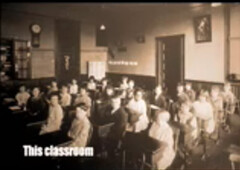When you outlaw iPods, then only the outlaws will have iPods.
Schools say iPods becoming tool for cheatersThis quote from a CNN article got me to thinking about us moving backwards instead of forwards. Why do we start throwing bans at things that we have yet to teach students about? Some things (like weapons, drugs, inappropriate clothing, etc) I understand. But if we are talking about an educational tool, how can we just make a statement like above begging for universal bans?
Kemp said she does not have hard statistics on the phenomenon but said it is not unusual for schools to ban digital media players."I think it is becoming a national trend," she said. "We hope that each district will have a policy in place for technology -- it keeps a lot of the problems down."

Have we yet to offer ethics , values, and expectation courses for the use of these items? Can we not stop to think how we could utilize what students really enjoy using as an educational tool? Are there going to be cheaters still? Sure. But there always has been and always will be. Let me just share one word of advice in this area: MONITOR. If students know a teacher is going to go back and sit down at the desk to read a book or newspaper during a test, it doesn't matter what they use to cheat with because it will be easy.
Quit muttering the political rantings press so love to hear. Share, instead, stories of beneficial use and positive outcomes about turning what seems to be a negative into a very beneficial positive.
Consider this from Duke University (in the same article):
Comments?The music players proved to be invaluable for some courses, including music, engineering and sociology classes, said Tim Dodd, executive director of The Center for Academic Integrity at Duke. At Duke, incidents of cheating have declined over the past 10 years, largely because the community expects its students to have academic integrity, he said.
"Trying to fight the technology without a dialogue on values and expectations is a losing battle," Dodd said. "I think there's kind of a backdoor benefit here. As teachers are thinking about how technology has corrupted, they're also thinking about ways it can be used productively."
Powered by ScribeFire.
Labels: administration, Scott_S_Floyd, technology, TXBWP, Web2.0
 I just wanted to share a
I just wanted to share a 